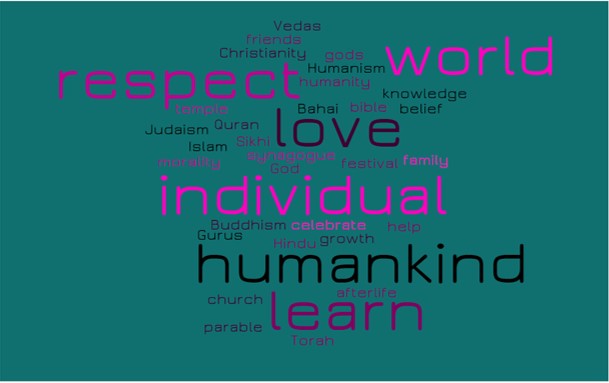Religious Education
Team
There is a team of teachers, supported by teaching assistants, who deliver the RE curriculum at Oaklands; overall co-ordination is undertaken by the subject leader.
Achievement and Progress
Assessment is made through continual teacher analysis which gives opportunities for additional support or extension activities where appropriate. Progress in lessons is measured against outcomes which are differentiated by difficulty; where appropriate brief summative assessments are given at the end of each unit which, when combined with ongoing teacher assessment, provide data to track pupil progress.
Curriculum Overview
Religious Education provokes challenging questions about the ultimate meaning and purpose of life, beliefs about God, the self and the nature of reality, issues of right and wrong and what it means to be human. It challenges pupils to reflect on, consider, analyse, interpret and evaluate issues of truth, belief, faith and ethics and to communicate their responses. Religious Education should encourage all participants to reflect on their own beliefs and values and to acknowledge that others hold beliefs different from their own. (Agreed new CWAC Syllabus Sept. 2019)
Religious Education has two closely related aspects:
Learning about Religion and Learning from Religion.
|
|
Autumn |
Spring |
Summer |
|
Year 7 |
Christian Beliefs and Teachings Who is God What is the bible Who is Jesus Why is Jesus important to Christians Christian festivals (Christmas) |
Jewish Beliefs and Teachings Beliefs about God The Torah The future Celebrations, festivals and special events Family and Community Life
|
Sikhi Beliefs and Teachings Who is Guru Nanak The importance of the Golden Temple The importance of their holy books Features of the Gurdwara Sikhi symbolism |
|
Year 8 |
Christian Practices Worship Celebrations, festivals & special events The Church How Christians pray
|
Islam Beliefs and Teachings Who is Allah Who is Mohammad The pillars of faith Muslim festivals |
Hinduism - Beliefs and Teachings Hindu beliefs about God Sacred Scriptures Worship (Puja) in the home and in the temple (Mandir) Celebration, festivals and special events |
|
Year 9 |
Buddhism - Beliefs / Teaching / practices Beliefs expressed in stories of the Buddha Teaching expressed in the Four Truths Symbols which help understand the teaching of Buddha Buddhist Practice Festivals and daily ceremonies The Buddhist community |
Baha'i Faith Beliefs and Teachings Baha'i belief in one God The Oneness of religion and progressive Revelation The Oneness of Mankind The Soul Worship and community life |
Humanist Beliefs and Christian Morals What are morals What is a parable What did Jesus teach How to respect others How to care for the world How to question the world around us |
KS4 Students all work towards an AIM Awards Entry Level Qualification
Introduction to General Religious Education
The Component has 7 standards and students will study the standards over two years. The component is assessed internally and externally verified by AIM Award.
| Y10 & Y11 |
|

Parents and carers can withdraw their child from any/all RE lessons. Please contact the school office if you wish to discuss this further.
